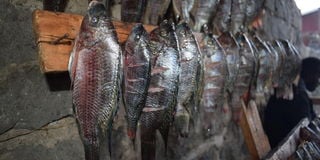When leadership fails: Why residents keep eating poisoned fish from Lake Nakuru while the authorities look away

Display of fried fish from Lake Nakuru by some local traders at the shores of Lake Nakuru.
At the shores of Lake Nakuru, a lake whose water has turned from salty to fresh, men and women haul nets every dusk and dawn in the hope of catching an affordable meal and making a good business.
For many young people, this miracle first appeared in 2021 when residents discovered that the alkaline, bird-filled lake contained fish large enough to sell.
Makeshift stalls sprang up around the lake as households began to survive on the 'new' protein source, but beneath the steam and sizzle lay a lethal secret. The fish were poisoned.
In 2021, the Kenya Marine and Fisheries Research Institute (KMFRI) tested samples from the lake and warned that the fish were unfit for human consumption.
Despite this warning, business continued to thrive and fish from the lake continued to flood local markets and be served openly in eateries in Nakuru town and beyond.

Fish from lake Nakuru being fried at the shores of Lake Nakuru.
Further warnings have followed, with scientists reconfirming in 2023 that the fish is unsafe, yet little has changed. In January 2024, the then Fisheries Cabinet Secretary, Salim Mvurya, reiterated this warning, emphasising that 'fish in the lake contain high levels of arsenic that are highly toxic and dangerous to humans'.
Then, on September 29, 2025, the Sub-County Fisheries Officer in Nakuru issued the latest notice to hoteliers and traders, ordering them to stop selling fish from Lake Nakuru and warning of prosecutions and licence revocation.
The fish business in Lake Nakuru remains elusive, and the only course of action appears to be reports from the national government, with warnings echoed at the devolved unit level but no tangible action taken.
Government officials have repeatedly met to tackle the issue, but it seems their recommendations often remain just that recommendations on paper that are filed away neatly until the next meeting.
Consumers seem to be aware of the risks, but take their chances anyway. The government often pleads with them, but to no avail. Consumers should not only be blamed, but also supported, as they have no legislative capacity to implement any recommendations regarding fish consumption unless the government takes stringent measures and provides alternatives.
Ironically, while state agencies should be offering protection, they issue notices and disappear. Meanwhile, residents are left to choose between hunger and the 'poisoned' protein.

Display of raw fish at the shores of Lake Nakuru.
Instead of meaningful interventions, the response has often been brutal: fishermen caught in the act have reportedly been beaten, tortured and forcibly disappeared at the hands of wildlife rangers. Mass arrests have also occurred, yet the trade never stops.
Such violence does not solve the problem, only deepening the mistrust. In fact, it exposes the hollowness of the state’s approach to punishing the underprivileged and allows the poisoned fish to continue to be sold.
From a scientific viewpoint, heavy metals accumulate in the body over time and cause long-term illnesses such as cancer, kidney disease and neurological damage. Children and pregnant women are at the greatest risk.
The tragedy befalling the lake’s fish appears to be political, with the failure of the KMFRI, the Ministry of Health, the county government, KWS and the national government showing through.
Beyond the initial notices and alarms, there has been no sustained enforcement. There has been no transparent clean-up plan for the lake, no permanent fencing to prevent fishing, no compensation or alternative livelihoods for fishermen, and no long-term health monitoring of local communities.
Instead, it seems as though every agency is burying its head in the sand. Meanwhile, the fish trade continues, aided by syndicates allegedly backed by the government that move the catch into the markets.
Nakuru residents deserve better, and at the very least, the government must take decisive action.
One option could be to impose a total moratorium on fishing in Lake Nakuru until independent tests confirm that the fish are safe for human consumption. The authorities must then publish all toxicology results openly, providing clear data rather than vague warnings that only fuel confusion.
Additionally, the government should develop alternative income projects that provide dignity and stability. Upstream pollution must also be strictly regulated to ensure that Nakuru's most famous lake is not used as a chemical dump disguised as a conservation area. Because exposure has likely already occurred, nearby communities should be screened for heavy-metal contamination and offered medical support.
Until then, every 'effort' is a reminder of failed governance and proof that the state knows its citizens are eating poison but is doing nothing to stop it. Until then, the 'poisoned' fish of Nakuru will remain cheap, dangerous and a shamefully ignored issue.


